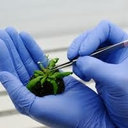Assessment of spring water microbiology and role of Typha angustata as biosorbent.
Keywords
Abstract
More than 2.1 billion people worldwide are deprived of safe drinking water at homes. The situation is strikingly worse in a developing country like Pakistan where over 69% of the population does not have access to safe drinking water. The present study evaluated a perenial herb, Typha angustata (TA), to purify the spring water. For this purpose, 25 water samples were collected. Majority of samples (20/25) were highly contaminated with microbes ranging colony forming units (CFU) per millileter per Petri dish ranged from 85 to 279 with an average of 136.4. Microbial inhibition of water samples treated with the nonmodified plant extract was observed to be better with the average of 55.5% compared to the treatment with NaOH chemically modified plant where average 46.4% inhibition of microbial load was observed. Four species of microbes such as Bacillus cereus, Pseudomonas aeruginosa, Pseudomonas otitidis, and Streptococcus agalactiae were identified after sequencing. We concluded that T. angustata extract may be used as an antibacterial agent/biosorbent for the purification of drinking water to provide safe drinking water to billions of humans. PRACTITIONER POINTS: Spring water samples were collected from 25 different springs. Spring water samples were analyzed for physiochemical parameters. Spring water samples were found to be contaminated with pathogenic bacteria, that is, Bacillus cereus, Pseudomonas aeruginosa, Pseudomonas otitidis, and Streptococcus agalactiae. Pathogenic bacteria in spring water samples were treated with extract of Typha angustata. Extract of Typha angustata was found as a potential antibacterial agent against pathogenic bacteria.


